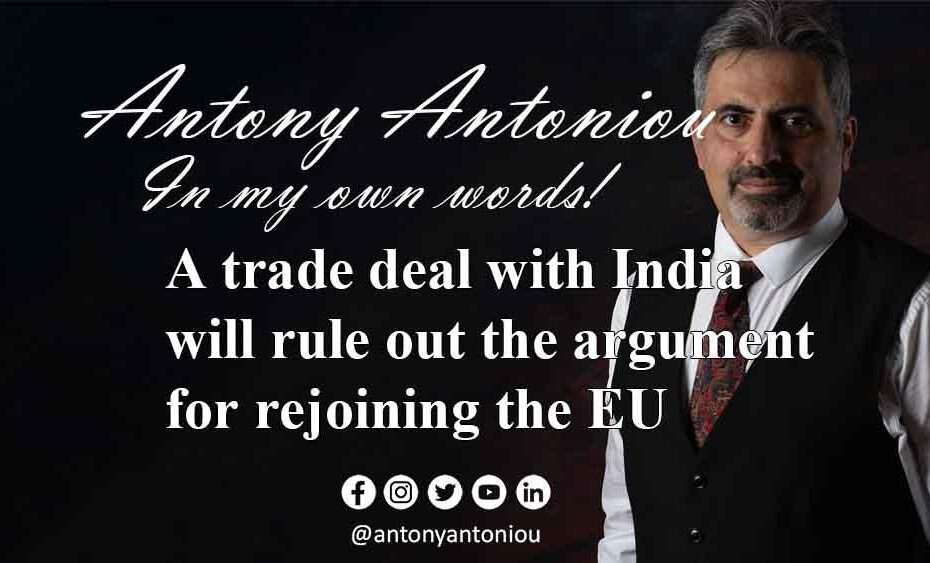A trade deal with India will rule out the argument for rejoining the EU
The Strategic Imperative: Why a Trade Deal with India Could Reshape Britain’s Future
In the ever-evolving landscape of global trade and politics, one impending move could redefine the trajectory of a nation. As Rishi Sunak’s tenure in office draws to a close, the prospect of a trade deal with India stands as a pivotal opportunity that could reshape Britain’s economic and geopolitical future. While Sunak’s accomplishments may not be overwhelmingly tangible, the potential of a comprehensive trade agreement with India is a legacy in the making, holding the power to solidify Britain’s pivot toward the East and decisively alter its stance on rejoining the European Union.
Embracing the East: A Trade Deal that Matters
Amid discussions of Sunak’s initiatives to promote mathematics in schools and elevate the popularity of chess, a trade deal with India emerges as the defining feat of his tenure. Such a trade agreement could pave the way for Britain’s closer alignment with the dynamic economies of Asia and the Pacific, presenting a viable alternative to the EU Single Market that the nation once clung to. With the European Union’s share of the global economy steadily shrinking and its regulatory complexities impeding growth, it’s clear that Britain must explore new avenues for trade.
The India Opportunity: Unlocking Prosperity and Influence
As the UK contemplates trade beyond Europe, India emerges as a natural ally. This South Asian powerhouse has already surpassed the UK in GDP and is projected to surpass the economies of Germany and Japan, becoming the world’s third-largest economy by 2030. A trade deal with India promises unparalleled economic opportunities for British industries, particularly in sectors where the nation has excelled, such as legal, financial, and consulting services. By establishing deeper economic ties with India, Britain can ingrain itself into Asia’s commercial fabric and propel its economic growth in an exciting direction.
History, Culture, and Commerce: Strong Foundations for Collaboration
Beyond the economic metrics, a UK-India trade deal builds upon the deep-rooted historical and familial connections between the two nations. Examples like Tata’s investment in an electric vehicle battery factory showcase the thriving flow of capital between the UK and India. The potential for lowered tariffs, simplified executive mobility, and unified trade standards can foster a flourishing ecosystem of business collaborations. This trade deal doesn’t just facilitate economic growth; it cements the strong interpersonal relationships that have flourished over centuries.
Geopolitical Implications: Charting a New Course
In a world marked by geopolitical complexities, a trade pact with India can exert far-reaching influence. By steering India toward Western trading systems, the UK can play a pivotal role in countering China’s ambitions to establish a dominant economic bloc. This partnership could safeguard India from being locked into China’s orbit and grant the UK greater influence on the global stage. Furthermore, such a move could forever alter Britain’s trajectory with regards to the European Union.
The Inevitable Shift: A Reimagined Future
With a trade deal in place, the UK would be firmly anchored in an Atlantic-Pacific trading framework. The combination of the Comprehensive and Progressive Agreement for Trans-Pacific Partnership (CPTPP), a trade agreement with India, and robust trade ties with North America would firmly establish the nation’s new trade narrative. This formidable alliance would fundamentally differentiate the UK from the EU’s Brussels-centric approach. As the paths of Britain and the EU diverge further, rejoining the European Union would become a distant and unrealistic prospect.
A Legacy in the Making: Sunak’s Opportunity
For Rishi Sunak, the journey to secure a trade deal with India represents more than a policy objective; it’s an enduring legacy. His familial connections and deep understanding of both countries could prove instrumental in driving this monumental agreement forward. Yet, challenges loom. The negotiation process could bog down in intricate details, and vested interests might hinder progress. With the clock ticking, the pressure is on to wrap up the deal before Sunak’s anticipated visit to India in September, and ideally, before the year’s end.
In the grand scheme of Britain’s history, this potential trade deal with India is a turning point. It’s a chance to forge new economic partnerships, harness global influence, and redefine the nation’s role on the world stage. As the timeline narrows and negotiations intensify, the significance of this trade deal cannot be overstated. It’s more than trade; it’s a vision for a reimagined future – one where Britain’s destiny is firmly shaped by the East.

